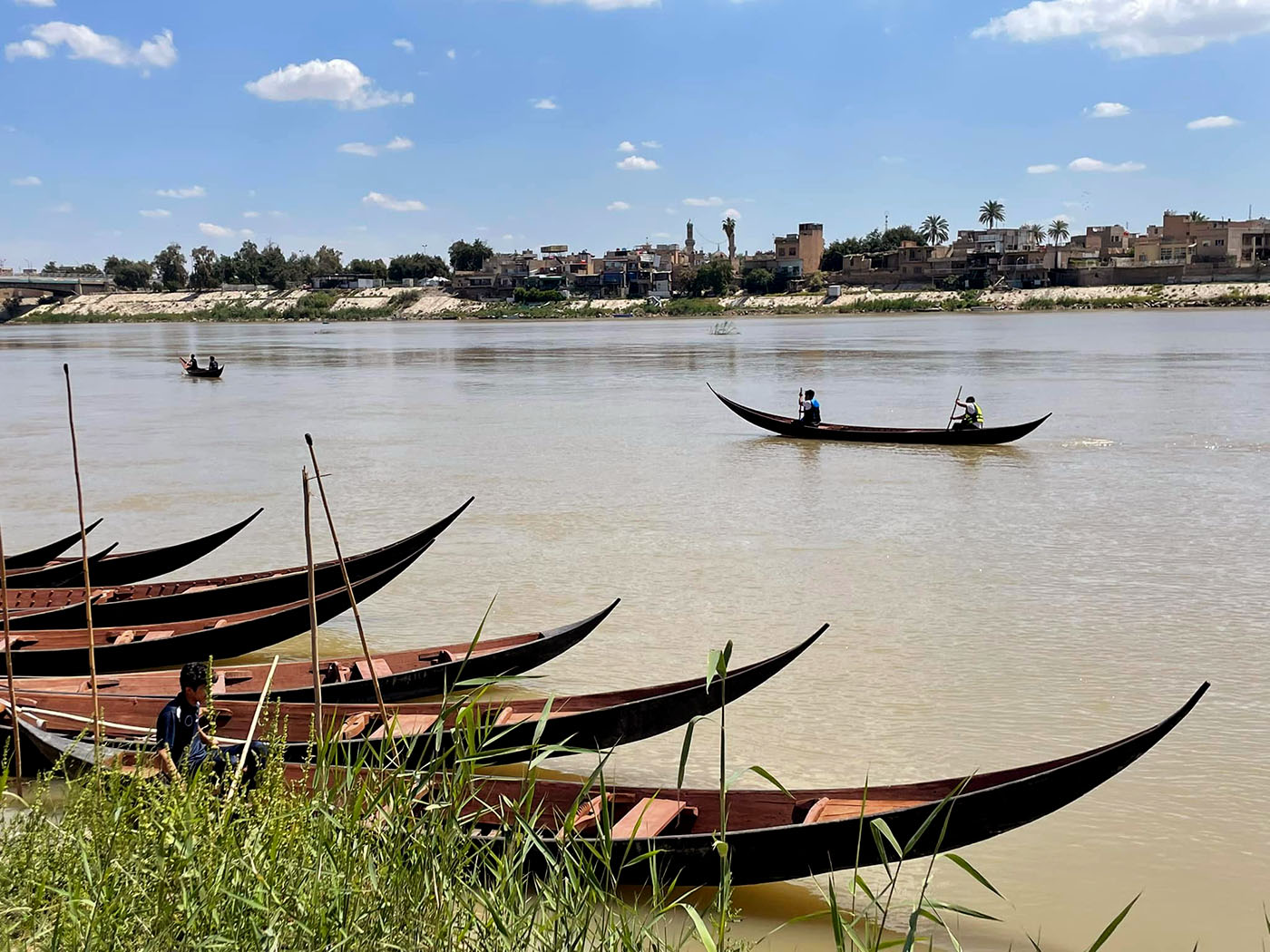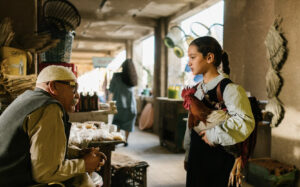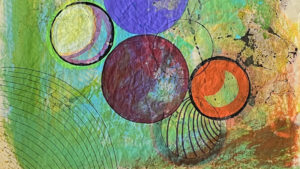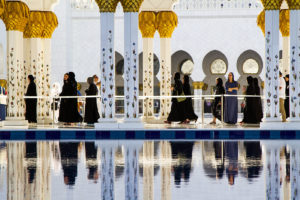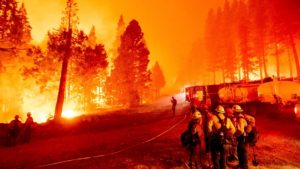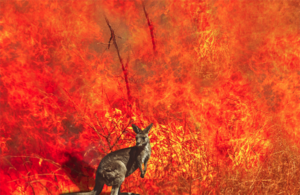The river Tigris is in danger. It has been the lifeblood of ancient Mesopotamia and modern Iraq, but geopolitics and climate change have left the region at risk of becoming uninhabitable. Adventurer Leon McCarron traveled by boat along the full length of the river, to explore what can be done to save it.
Wounded Tigris: A River Journey Through the Cradle of Civilisation, by Leon McCarron
Corsair/Little, Brown Book Group 2023
ISBN 9781472156235
Nazli Tarzi
When I told my Iraqi friends and family that an expedition along the full length of the Tigris was attempted in 2021, some roared with laughter, while others went silent, seemingly confused.
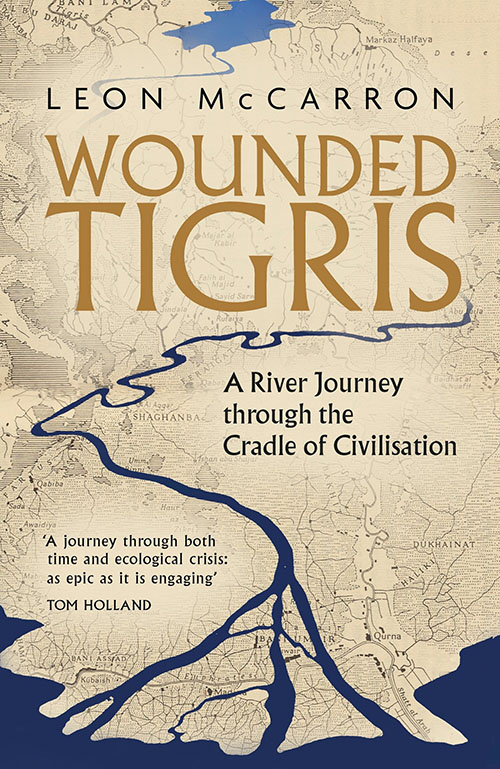
The end result of that expedition is a rollicking 350-page book, Wounded Tigris: A River Journey Through the Cradle of Civilisation, by 36-year-old Irish adventurer and writer Leon McCarron, who has lived in Erbil since 2016 and led the months-long journey. Accompanying him was Iraq-based photographer Emily Garthwait (who is also his partner), Swiss photographer Claudio von Planta, and two Iraqis, environmentalist Salman Khairallah, who in 2019 was kidnapped by militias and later released, and interpreter Hana Ibrahim, whose pastimes include nursing injured birds back to health.
Contrary to the title, the book’s central protagonist is not the river, but the ecology and settlements that owe their existence to Iraq’s fluvial lifeblood. This is nicely captured in the author’s passage on the local history of Wasit, a former commercial hub in medieval Iraq:
Wasit was, like all Mesopotamian cities of antiquity, built by a river. The Tigris once flowed through and encouraged construction of the schools and palaces of the Umayyads and Abbasids. The city was an important military and commercial node in the networks of the caliphates, and became a hub for boatbuilding. And then, in the fifteenth century, the river pulled away. Within a century, it was no longer sustainable for a city to survive here without the water. The fields and channels were left to silt up, then to dry completely. The inhabitants left, and wind, sun and time did the rest.
McCarron concludes, quite soberly: “If ever we needed a reminder of the life-giving power of the Tigris, and what happened if it was taken away, here it was.”
Before the author/traveler and his eclectic cohort embarked on their journey, their image of the Tigris was that of Iraq’s beating heart, the center of its life. This image receded against the tidal wave of reality which emerged days into their voyage, which started in southern Turkey (at the river’s headwaters). As they progressed southward through Iraq, they realized that the grandeur of the Tigris had faded; water levels had receded drastically, salinity levels were alarmingly high, the river’s tributaries were poisoned, clogged, and threatened by hydropower dams, and its riverbanks were visibly militarized. For one thing, the Southeastern Anatolian Project, launched by Turkey in the 1980s, had irrevocably altered the headwaters of both the Tigris and Euphrates, and caused “depleted inflow” in neighboring Iraq and Syria. Mosul Dam is another case study of the way that political decisions disfigure and erode ecosystems and threaten loss of life. McCarron traces the history of Mosul Dam, describing it as Saddam Hussein’s “vanity project,” whose shaky foundations and elaborate grouting operations to prevent it from bursting on the banks of the river is “entirely the product of ego and poor planning and a broken system.”
Thus, the book pivots between two portraits. There is the Tigris of antiquity, Dijlat al-Khayr: a river of abundance presided over by mighty kings — Sumerian, Assyrian, and Babylonian. And then there is its near-inverse, the Tigris of today: enfeebled, scarred, and thirsty.
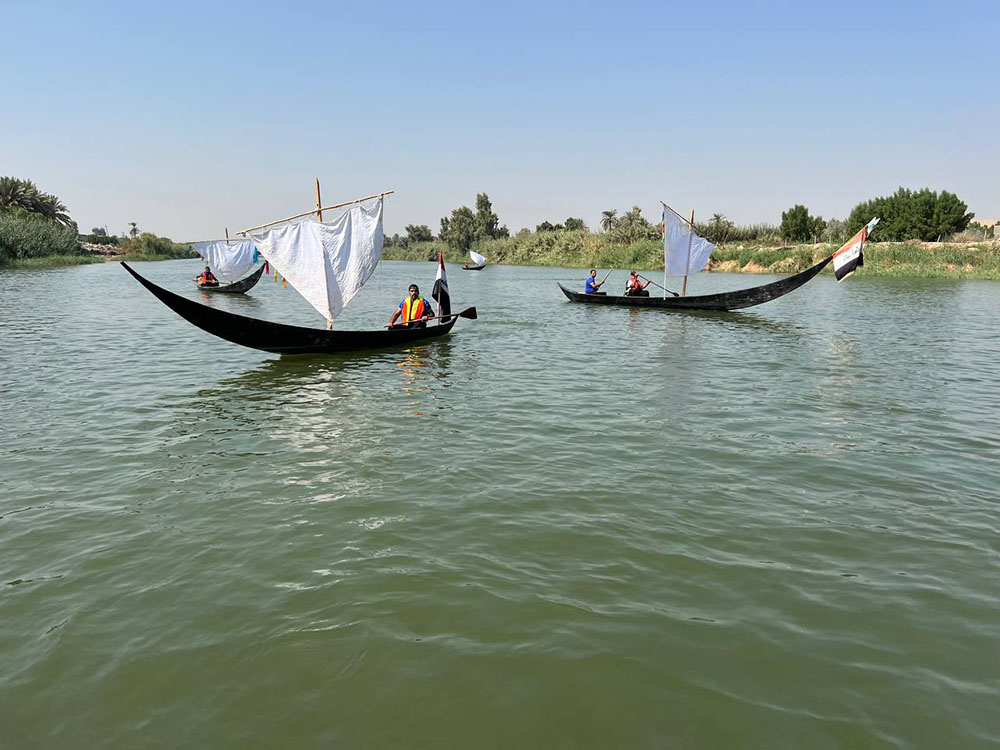
The appeal of McCarron’s part-travelogue, part-journalistic account of Iraq’s recent history is not limited to river enthusiasts or Iraq pundits. The developments, events, and characters featured in the book will draw in casual readers, historians, and, not least, anthropologists and students eager to learn about the mosaic of communities the team met along the way: Assyrians, Ezidis (often rendered “Yezidis” or “Yazidis”), Turkmen, Fayli Kurds, Marsh Arabs, and, not least, Sahwas — largely Sunni tribal elements recruited by the US to fight Al-Qaida that have since become a political force. Most important are the aptly and at times poetically communicated shared experiences between the river and its people. Both are silent victims of political neglect and social engineering. Both have fallen prey to political violence, militia fighting, and unrelenting terrorism since the genesis of the Islamic State group, and, not least, the toxic environmental legacy of the US-led 2003 invasion of Iraq.
That said, in reading Wounded Tigris, the fizz of my initial excitement started to flatline midway through the book, as the ever-growing cast of military actors began to dictate the tone of later chapters. Checkpoints peppered the banks of the river at “every half mile,” the author informs us. As such, engagement with largely Shiite Hashd fighters (members of the parastatal umbrella group, the Popular Mobilization Forces) and Iraqi soldiers guarding these security points was inevitable. The team, whether admirably or stupidly, was passing through areas of recent Islamic State influence and operation (Mosul and Salahuddin) as part of their trip. This could have occasioned discussion of local hostility to the Hashd militias, whose pervasive involvement in war crimes against Sunni civilians has eroded their popularity, but the book does little to address this issue. In fact, I was struck by the admiration McCarron expresses for Hashd groups. As an Iraqi who works in the media industry, monitoring developments on the ground in real time, perhaps I have less tolerance than others for stories that humanize people who should stand trial for war crimes — but almost certainly never will.
Nonetheless, McCarron does well to share humorous stories of his encounters with armed men and often very young men, whose human side the book unveils. He also relates more sinister stories in which the team was almost shot at for entering “no go zones” along the Tigris. The author’s experience of these security implications and the way they inhibit free travel creates an unspoken sense of solidarity between him and the host population, who are equally inhibited.
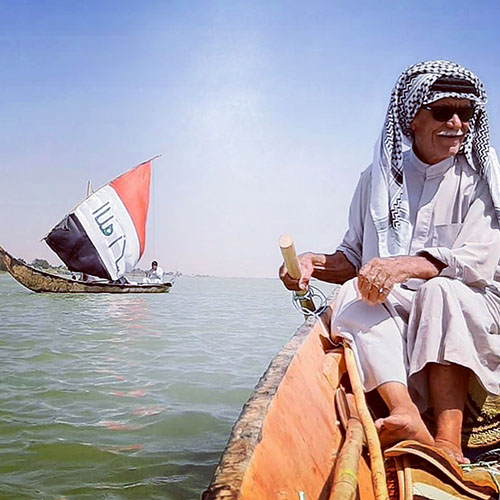
Other anecdotes may feel a little repetitive, at least to those of us well-versed in Iraq coverage. One such example is the story of Umm Qusay, a reputable humanitarian from Tikrit who saved hundreds of Shiite cadets from the Camp Speicher Massacre, in which the Islamic State massacred as many as 1,500 military conscripts. Umm Qusay has been widely featured in media coverage. To quench my thirst for local storytelling, I crave exclusivity and a granular texture absent from most of the stories that make it out of Iraq.
The book best delivers on this in its treatment of the local history of boatbuilding. We travel back in time as the author catalogs the litany of handcrafted water vessels that graced the Tigris, as well as the Euphrates, in pre-industrial Iraq; the Kelek, Meshouf, Guffa, and Tarrada, among others. McCarron acknowledges London-based Iraqi-German multimedia artist and founder of the Safina Projects, Rashad Salim, who provided him with much guidance ahead of his voyage and pointed him in the direction of local boatbuilders, a rare breed in today’s Iraq. He intricately describes their craftsmanship, and some of the vessels they make out of fibreglass and coat in tar or bitumen. Some are 10-foot-long structures that resemble canoes, while others are cylindrical, shaped like giant baskets, and crafted through ancient traditions passed down the generations. The rekindling of these traditional boat-making practices, even if confined to a small number of craftsmen, is something the author is keen for readers to know about.
The boatbuilding theme complements the book’s secondary focus: climate change. The undeniable impact of rising temperatures in Iraq can no longer be brushed aside. Though the book could have delved deeper into the question of the present-day situation and the wholly inadequate reaction of the ruling political class to the climate crisis, its grip on the recent history of the subject is both topical and moving. Iraq is faced with an ever-growing heap of climatic problems: climate migration, prolonged drought, and the death of livestock en masse, unable as they are to survive the punishing heat. The way climate change is part and parcel of the morass of issues plaguing Iraq is well captured as the book zig-zags in and out of history and the policies of the Baath regime to explain the build-up of problems that led to this moment.
Overall, Wounded Tigris strikes a careful balance between the sad and the gently satirical. Most entertaining are numerous sketches featuring flamboyantly colorful characters whose energy feels palpable due to McCarron’s masterful prose. I particularly enjoyed the commentary on Iraqi moustaches: wispy moustaches; heavy moustaches, pencil moustaches, and experimental moustaches. For each of these styles, I could summon a mental image of an uncle or former army general. The point to be made is less about the aesthetic preferences of middle-aged Iraqi men and more about the way these characters capture life in the land of the twin rivers.
This is further complemented by McCarron’s detail-rich description of Iraq’s landscapes, ancient ruins, and enduring beauty: “honey-coloured streams,” “tentacled lakes,” the “pink noses” of the water buffalo basking in the marshes, herds of long-eared goats, a confetti of birds, and, not least, the “leathery” Euphrates softshell turtle, an endangered aquatic species that the author develops a soft spot for.
Yet the beauty of the land is punctured by scenes of industrial-scale pollution, towns whose air is “tangibly thick and noxious,” and a stretch of the river that has “become a receptacle for all the garbage in the northern part of the drainage basin.” The worst form of pollution, as the author points out, is the death with which the river has become synonymous: decaying bodies, bloated bodies, missing bodies, tortured bodies, all flowing through the Tigris and washing up along its banks.
The story McCarron tells in Wounded Tigris is not linear, uncomplicated, or pleasant. He accepts that the portrait of Iraq he has pieced together is imperfect, but he writes an irresistibly compelling story. The relationship Iraqis have to the once-mighty Tigris is complicated and difficult to define, but this attempt comes close.



